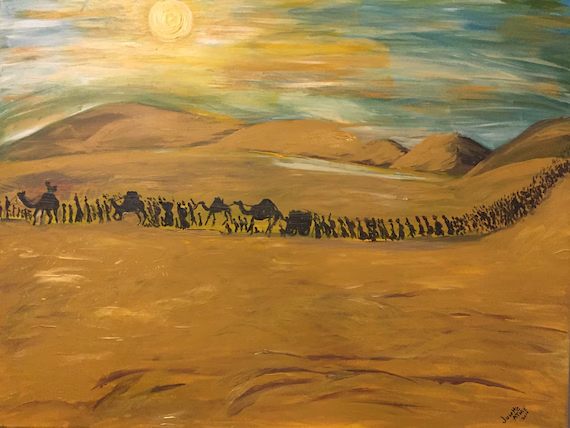Jesus Rides into Jerusalem
Jesus and his disciples walked to the great city of Jerusalem. Jesus wanted to be there for the special festival of the Passover.
On the way, they stopped near the village of Bethany.
Jesus said to two of his disciples; 'Go into the village. There you will find a donkey that has never been ridden. Untie it and bring it here.
If anyone asks you why you are taking it, tell him 'The Lord needs it and will return it, and he will let you have it.
The two disciples did as Jesus told them, and found the donkey tied by a door near a crossroads. When they untied it, they were asked why they were taking it, and replied as Jesus had told them.
They led the donkey back to Jesus, and spread their cloaks over its back to make a soft seat. Then Jesus got on the donkey and rode into Jerusalem with his disciples walking at his side.
When the crowds of people walking to the city saw Jesus coming, they were very excited. Some spread their cloaks on the road in front of the donkey's hoofs.
Others cut down palm leaves to lay on the road.
They cheered and shouted; 'Blessed is he who comes in the name of the Lord. Praise be to God.
Jesus and his disciples went into the city and walked through the streets to the Temple. Then they left, and went back to the village of Bethany for the night.
The next morning, Jesus went again to the Temple in Jerusalem to pray. The courtyard in front of the Temple was like a market, with traders selling cows, sheep and doves and changing money.
Jesus was very angry. He stormed through it. Overturning the tables of the money-changers and the seats of the traders, driving them, and the animals and birds, out of the Temple courtyard.
'God's house is a house of prayer, he shouted; 'but you have Jurned it into a den of thieves.
When all was quiet and peaceful again, Jesus talked to the throngs of people, teaching them about God, and healing the ones who were ill.
The chief priests and rulers of the Temple heard what Jesus had done, and decided they must get rid of him.
They were afraid of him and the way the people flocked to hear him.
They didn't dare arrest him while he was in the Temple courtyard because they were frightened that the people might riot to protect him.
They plotted to do it when there was no one to see them. Judas Iscariot, one of the twelve disciples, went secretly to the chief priests of the Temple.
Now he was ready to betray Jesus.
'What will you give me if I tell you where and when you could safely arrest Jesus, he asked the chief priests.
They were very pleased to see Judas and promised to give him thirty silver coins.
From then on. Judas Iscariot waited and watched for the right moment to betray Jesus to the Temple priests. It had to be when he was alone, with no crowds of people to defend him.










Comments
Post a Comment